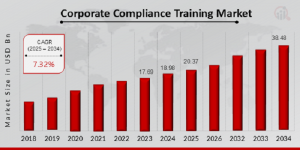Corporate Compliance Training Market Predicted to Hit 38.48 Billion by 2034
Rising regulations, tech adoption, and industry-specific needs drive growth in the evolving, AI-powered corporate compliance training market.
The corporate compliance training market is experiencing robust growth as organizations across the globe increasingly prioritize regulatory adherence, ethical conduct, and risk management in a dynamic and complex business environment. Compliance training refers to the formal programs and educational efforts undertaken by companies to ensure employees understand and comply with laws, regulations, standards, and internal policies. This training helps mitigate legal risks, avoid financial penalties, and maintain a company’s reputation. The rising frequency of regulatory updates across industries such as finance, healthcare, manufacturing, and technology is compelling organizations to invest more heavily in compliance education. Additionally, the growing emphasis on corporate governance, workplace diversity, data privacy, anti-corruption practices, and cybersecurity compliance is driving demand for tailored and scalable training solutions. Technological advancements, including e-learning platforms, AI-driven content customization, and virtual simulations, are transforming the delivery and effectiveness of compliance training, making it more accessible, interactive, and measurable.
Download Sample Pages: https://www.marketresearchfuture.com/sample_request/28038
Market Segmentation:
The corporate compliance training market can be segmented based on type of training, organization size, industry vertical, deployment mode, and geography. By training type, the market includes regulatory compliance, workplace harassment and ethics training, data protection and privacy compliance, anti-bribery and corruption, and industry-specific regulatory training. Regulatory compliance and ethics training remain dominant segments, largely due to stringent enforcement by government bodies and regulatory authorities. Based on organization size, the market is divided into large enterprises and small & medium enterprises (SMEs), with large enterprises contributing a significant share owing to greater compliance obligations and resources. Deployment modes include on-premise and cloud-based solutions, with cloud-based platforms gaining popularity for their flexibility, scalability, and remote accessibility. Industry-wise, sectors such as banking and financial services, healthcare, IT and telecom, manufacturing, energy, and pharmaceuticals are prominent adopters of compliance training programs due to the highly regulated nature of their operations. Geographically, the market is analyzed across North America, Europe, Asia-Pacific, Latin America, and the Middle East & Africa.
Market Key Players:
Several prominent players dominate the corporate compliance training market, offering comprehensive platforms and specialized content tailored to various industries and organizational needs. Key companies include:
• Skillsoft
• Wolters Kluwer
• KnowledgeCompliance
• Navex Global
• Intellilearn
• NetApp
• LRN
• EthosCE
• ComplianceLine
• QuisLex
• Mitratech
• Baker McKenzie
• SAI Global
• Thomson Reuters
• Bureau Van Dijk
Browse In-depth Market Research Reports On Corporate Compliance Training Market: https://www.marketresearchfuture.com/reports/corporate-compliance-training-market-28038
Market Opportunities:
The corporate compliance training market presents numerous opportunities for growth and innovation. With increasing globalization and remote work environments, the demand for multi-lingual and culturally sensitive training content is on the rise, offering companies the chance to create diverse and inclusive learning experiences. There is also a growing need for continuous learning models that offer real-time updates in response to evolving legal frameworks and corporate standards. The rise of environmental, social, and governance (ESG) initiatives across organizations provides an avenue to expand training modules around sustainability, ethical sourcing, and social responsibility. Additionally, the emergence of adaptive learning technologies and analytics tools enables organizations to monitor training effectiveness, identify compliance gaps, and make data-driven decisions to improve outcomes. Expansion into emerging markets, where regulatory frameworks are rapidly developing, also represents a significant growth opportunity for solution providers looking to capture new customer bases.
Restraints and Challenges:
Despite the positive outlook, the corporate compliance training market faces several restraints and challenges that could hinder growth. One of the main challenges is the high cost associated with the development and customization of training programs, particularly for smaller enterprises with limited budgets. Ensuring that training content remains current and aligned with frequently changing regulations also requires continuous investment and expert involvement. Employee resistance to training, especially if perceived as repetitive or irrelevant, can impact engagement and learning outcomes. Additionally, measuring the return on investment (ROI) and long-term effectiveness of compliance training remains a concern for many organizations. Technical issues such as platform integration, data privacy compliance within training systems, and managing training delivery across geographically dispersed teams further add to the complexities faced by compliance officers and training managers.
Procure Complete Research Report Now: https://www.marketresearchfuture.com/checkout?currency=one_user-USD&report_id=28038
Regional Analysis:
Regionally, North America holds a significant share of the global corporate compliance training market, primarily driven by strict regulatory enforcement, a strong presence of large multinational corporations, and an advanced digital infrastructure. The United States is a major contributor to regional demand due to regulatory mandates from agencies such as the Securities and Exchange Commission (SEC), Occupational Safety and Health Administration (OSHA), and the Department of Justice (DOJ). Europe also represents a major market, with the General Data Protection Regulation (GDPR) and other country-specific mandates compelling businesses to adopt comprehensive compliance training programs. The Asia-Pacific region is witnessing rapid growth, fueled by the expansion of multinational companies, increased awareness of workplace ethics, and evolving regulatory landscapes in countries like China, India, and Japan. Latin America and the Middle East & Africa are emerging markets showing promising potential, particularly in industries such as energy, healthcare, and banking, where compliance requirements are becoming more structured and enforced.
Recent Developments:
Recent developments in the corporate compliance training market highlight the growing sophistication and demand for flexible, results-driven solutions. Companies are increasingly adopting Learning Management Systems (LMS) that offer AI-based personalization, real-time analytics, and mobile-first designs to improve user experience and accessibility. Vendors are also expanding their offerings to include short-form video content, scenario-based learning, and interactive assessments that boost retention and employee participation. Many organizations are partnering with content specialists and legal experts to ensure that training materials are accurate, relevant, and legally compliant. Furthermore, the integration of compliance training with broader talent management and employee engagement platforms is becoming more common, promoting a culture of learning and accountability. Subscription-based models are also gaining popularity, allowing organizations to continuously update content, access support, and scale training efforts efficiently. These innovations are not only enhancing training effectiveness but also positioning compliance as a strategic function within organizational development and risk management frameworks.
Related Reports
Cellular Interception Market;
https://www.marketresearchfuture.com/reports/cellular-interception-market-27398
Cloud Based Business Analytics Software Market;
https://www.marketresearchfuture.com/reports/cloud-based-business-analytics-software-market-27380
Automatic Speech Recognition (ASR) Software Market;
https://www.marketresearchfuture.com/reports/automatic-speech-recognition-asr-software-market-27251
Mips Bicycle Helmets Market;
https://www.marketresearchfuture.com/reports/mips-bicycle-helmets-market-27713
Mobile Card Reader Market;
https://www.marketresearchfuture.com/reports/mobile-card-reader-market-27705
Breast Cancer Epidemiology Report | In-Market Drugs, Treatment, Trends, Rising Incidence & Prevalence 2025-2035
Green Carpet’s Cleaning Shares Best Practices for Carpet Cleaning During Allergy Season
Former Delilah’s Den Nightclub in Atlantic City Hits Auction Block as CRDA Eyes Revitalization
Więcej ważnych informacji
 Jedynka Newserii
Jedynka Newserii

 Jedynka Newserii
Jedynka Newserii

Handel

Komisja Europejska chce wprowadzić ujednolicone przepisy dotyczące wyrobów tytoniowych. Europosłowie mówią o kolejnej nadregulacji
Ministerstwo Zdrowia opracowało nowy projekt przepisów wprowadzających kolejne zakazy dotyczące wyrobów tytoniowych – całkowitą eliminację e-papierosów oraz zakaz aromatów w woreczkach nikotynowych. Najprawdopodobniej w ciągu kolejnych dwóch–trzech lat Polska będzie musiała implementować nową dyrektywę dotyczącą wszystkich produktów tytoniowych, nad którym niebawem ma rozpocząć prace Komisja Europejska. Europosłowie mówią o ryzyku chaosu legislacyjnego, nadregulacji i wskazują na zagrożenia związane z proponowaną podwyżką akcyzy.
Konsument
Za trzy miesiące ruszy w Polsce system kaucyjny. Wątpliwości budzą kwestie rozliczeń i podatków

Zaledwie trzy miesiące zostały do startu systemu kaucyjnego w Polsce. Kaucje obejmą szklane i plastikowe butelki oraz puszki z napojami. To duża zmiana dla producentów napojów, sklepów i konsumentów oraz pośredniczących w zbiórce operatorów systemów kaucyjnego. Na razie przepisy są na tyle niedoprecyzowane, że budzą wiele wątpliwości w kwestii rozliczania podatków czy rozliczeń z operatorami. Producenci będą musieli płacić podatek od niezwróconych butelek, co zwiększy ich koszty.
Transport
Rośnie skala agresji na polskich drogach. Problemem jest nie tylko nadmierna prędkość, ale też jazda na zderzaku

Za kilka dni zaczynają się wakacje, czyli statystycznie najniebezpieczniejszy czas na drogach. Wśród głównych przyczyn takich zdarzeń na prostych odcinkach drogi są nadmierna prędkość i jazda na zderzaku. Zarządca autostrady A4 Katowice–Kraków w ramach kampanii „Nie zderzakuj. Posłuchaj. Jedź bezpiecznie” zwraca uwagę na zjawisko agresji na polskich drogach i przypomina, że bezpieczeństwo zaczyna się od osobistych decyzji kierowcy.
Partner serwisu
Szkolenia

Akademia Newserii
Akademia Newserii to projekt, w ramach którego najlepsi polscy dziennikarze biznesowi, giełdowi oraz lifestylowi, a także szkoleniowcy z wieloletnim doświadczeniem dzielą się swoją wiedzą nt. pracy z mediami.










.gif)

 |
| |
| |
|